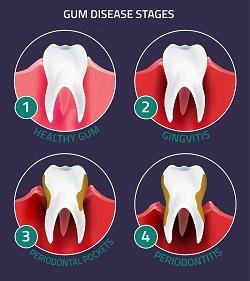 Periodontal disease, commonly called gum disease, can have a devastating effect on your smile if it isn't diagnosed and treated promptly. Luckily, familiarizing yourself with common gum disease signs and symptoms can help you ensure that you receive the care you need. Your San Diego, CA, periodontist, Dr. Joseph Yang of San Diego Dental Implant Center, offers treatments that help his patients protect their smiles.
Periodontal disease, commonly called gum disease, can have a devastating effect on your smile if it isn't diagnosed and treated promptly. Luckily, familiarizing yourself with common gum disease signs and symptoms can help you ensure that you receive the care you need. Your San Diego, CA, periodontist, Dr. Joseph Yang of San Diego Dental Implant Center, offers treatments that help his patients protect their smiles.
How can I tell if I have gum disease?
Signs of periodontal disease can be subtle, particularly in the early stages of the disease. If you have gum disease, you may notice:
- Blood on Your Toothbrush: Bleeding is not a normal part of brushing your teeth. If your brush looks pink or red after your brush, your gums are irritated and inflamed. Bleeding when brushing can be a sign of gingivitis, the earliest phase of gum disease.
- Mouthwash Doesn't Help Your Bad Breath: When frequent brushing and plenty of mouthwash doesn't improve your breath, gum disease may be to blame. The odor may occur due to an increase in bacteria in your mouth.
- Your Gums Look and Feel Different: Periodontal disease can cause your gums to redden and swell. Even slight pressure from your finger can cause pain if you have gum disease.
- It Hurts to Chew: Chewing can be painful when your gums are inflamed and swollen.
- Your Teeth or Dentures Are Loose: In advanced gum disease, bacteria can damage your gums, ligaments and jawbone, which may loosen teeth or affect the fit of dentures.
- Your Gums Aren't Firmly Attached to Your Teeth: The bacterial infection can cause your gums to pull away from your teeth forming deep pockets if you have severe gum disease. If the disease isn't treated successfully, you may lose teeth.
How is periodontal disease treated?
Improved oral hygiene habits and a thorough dental cleaning may improve the health of your gums if you have gingivitis. A deep cleaning that removes plaque, tartar and bacteria above and below the gum line may be needed if the disease is more advanced. If you have severe gum disease, your San Diego periodontist may recommend surgery to eliminate pockets, bone grafts to replace lost bone, or soft tissue grafts to restore gum tissue.
Have you noticed any signs of gum disease? If you have, call your San Diego, CA, periodontist, Dr. Joseph Yang of San Diego Dental Implant Center, at (858) 578-2205 to schedule an appointment.
